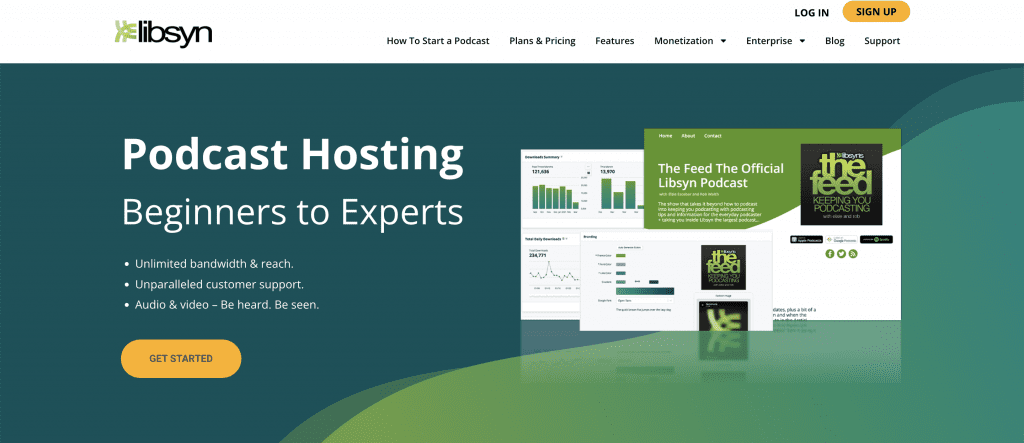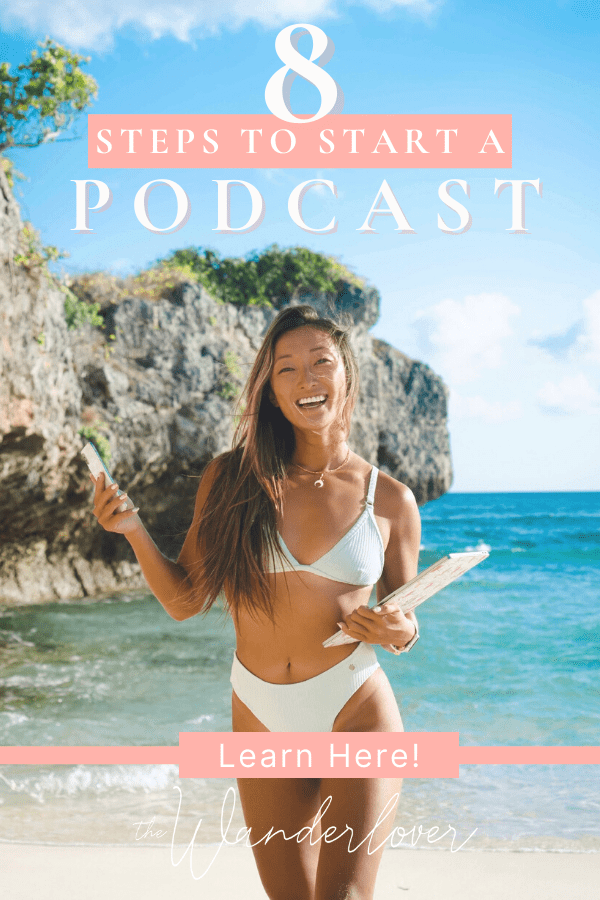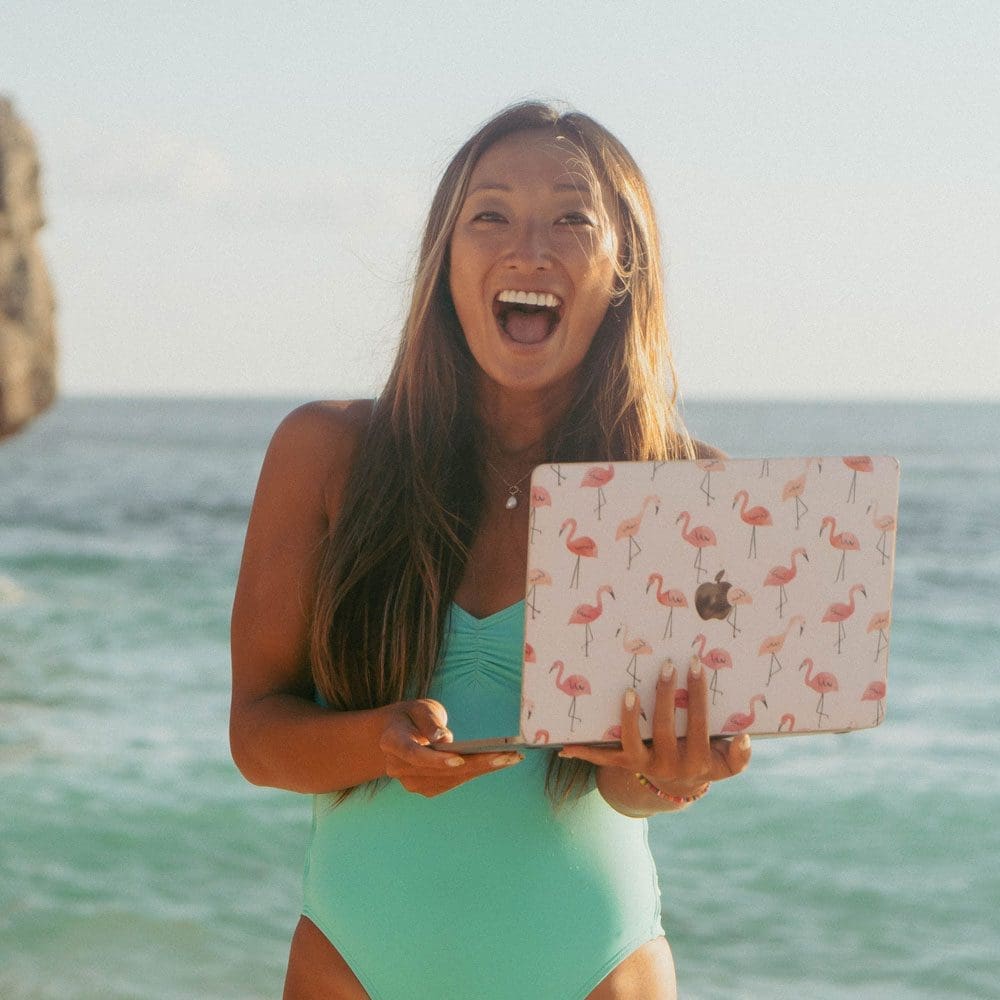When learning how to start a podcast, the three most common questions I get are:
- Is it too late to start a podcast?
- Do you have any tips for starting a podcast?
- How do I start a podcast with no audience?
The best time to plant a tree was 20 years ago. The second best time is now.
With all the time that you are spending, deciding whether or not it’s too late to start a podcast, trying to research or gather information if it’s too late, you could have started a podcast by now!
In this post, I’m going to break down how to start a podcast into the technical part of podcasting, and then on to the Marketing side.
After growing The Wanderlover Podcast to 100k+ downloads and helping my clients launch theirs, I am very familiar with this space.
I’m going to share with you step-by-step how to start a podcast and launch it in the next week if you wanted to!
Let’s get started.
Can you start a podcast without an audience?
Yes! You totally can start a podcast without an audience, and the good news is your audience is only going to grow! When starting any new venture or business, you’re most likely going to start from 0 at one point or another.
You can’t have your 50th episode without having your first.
You can’t have your 10,000th listener without having your first.
So just commit to doing it, and I’ll show you exactly how.
1. Decide on Podcast Structure
First and foremost, you need to decide on the name of your podcast, and what your podcast is going to be about.
- Are you going to speak directly to the microphone or are you going to bring on guests?
- How long will your episodes be?
- How often will you release new episodes?
- What is your WHY behind the podcast?
Have your mission statement front and center.
If it’s an offset of your own personal brand or your business, it will most likely share the values of your business, right?
For example, with The Wanderlover Podcast, it reflects everything that The Wanderlover is about: enabling travel and freedom through entrepreneurship.
This will help you record quality content that resonates with your audience.
2. Prepare to Record
Next, start brainstorming episode ideas for your new podcast. I usually have between 10-15 ideas in a note on my phone of episode ideas that I can always refer back to.
You then need to decide on your equipment for quality audio. This doesn’t have to be a purpose-built microphone. If you have a laptop and headphones, you have something to record with!
If you are able to invest in a microphone, I would recommend it. After all, it is also a way to help with your commitment to your new podcast.
This doesn’t mean buy the most expensive microphone on the market, but just something with quality sound that suits your budget.
The one I record with is the HyperX QuadCast microphone.
Finally, decide what audio software you will record on.
You could use a paid application such as Adobe Audition, find a free recording software online or even record in voice memos on your phone.
All that matters at this stage is making decisions that will ensure you start recording. Done is better than perfect!

3. Record Intro + 3 Episodes
The Intro
Write a script for your introduction that communicates who you are, what you’ll be talking about and why you started this podcast. Once recorded, you can use this to intro every episode going forward. Of course, you can change this at any time!
The Episodes
Starting off with 3 episodes means that you can create a bigger buzz around your podcast! But it ALSO gives more episodes for listeners to binge on – ultimately increasing your downloads in launch week and helping your ratings.
An example guide for your first 3 episodes:
Episode 1 – An introduction including your story, what makes you relatable to your target audience and the value they will gain from this podcast
In my first podcast episode, I talk about The Wanderlover Story and my journey from Corporate to full-time content creator and business coach.
Episode 2 – Discuss a core value or message to set the tone for future episodes.
Episode 3 – A high-value episode that answers a common question you receive.
Obviously, this is just a guide, the best bit about having your own podcast is running it how you like!
4. Post-Production
This is where you need to choose whether you want to hire a podcast producer to edit the episodes, or if you want to do it yourself.
If you have the budget I would definitely recommend hiring someone because it can be a very time-consuming and painstaking task if it’s not your forté. However if you have the time and skills, and want to learn audio editing, go for it!
Next is deciding on your intro music. Unless you’re paying someone to create the intro music for you, this needs to be royalty-free audio.
You can find this through google which will give you many different royalty-free music website options. Just choose a jingle that matches your brand and stick to it.
Lastly you need a podcast hosting provider. This is to host your recordings on their server and it is from here that you can publish to Apple, Spotify and other podcasting apps.
I use Libsyn but any well-known provider will offer similar levels of experience. Don’t get too stuck here! Just choose any so you can start!

The only part of choosing your podcast hosting provider that may be difficult (only because you’re new to podcasting) is selecting a plan the correct upload size for your podcast. This all depends on how long your episodes are and how frequently you’re going to upload episodes.
For me, since I upload weekly episodes of 30 minutes I use the Libsyn Classic 250 package which gives me 250MB of uploads each month.
But don’t stress too much about this. The provider will have a guideline for each package and what kind of podcaster it is suitable for.
Many websites also have chat functions or emails where you can ask for guidance around your podcast specifically.
5. Prepare to Launch
Pick a launch date – AND STICK TO IT!
This date should be at least two weeks into the future, to both allow for complications and because you need to get approval from Apple, Spotify and all of the other podcasting apps to be listed in their directories.
You can do this through your podcast hosting provider by selecting the option to add your episode to the directories of your choice.
You just need to sign up once for each directory and you never have to request permission ever again. It will automatically send each episode you upload to each of the podcast applications.
When submitting your episode to podcasting directories you’ll have to enter your name, show description, episode title and podcast cover.
You can easily create the cover in Canva by choosing a template and adjusting it to your brand colors for a quick and pretty cover!
6. Monetization
There are 3 main ways you can monetize your podcast:
Auto Ads
Auto Ads are advertisements that are automatically placed before, after, and during your episodes. You get paid for impressions. The more people that listen to the ads, the more you get paid.
You can set these up with Libsyn in the dashboard.
Sponsorships
Sponsorships are short segments between 15 and 60 seconds where you are promoting someone else’s business on your podcast.
Usually, you record these and insert them before, during, or after your episode.
Promote Your Own Products and Services
My favorite way to monetize your podcast is by promoting your own products and services! Think of your podcast as free advertising space.
If others are going to pay you for promoting their content, why not self-promote the heck out of yours!
7. Stay Consistent
Outsourcing everything outside of you actually recording the podcast is definitely the easiest way to stay committed, because then you only have to worry about the core recording bit!
This can even be someone you find on freelance platforms such as Fiverr. This helps keep the workflow consistent and sustainable!
You can download the Content Calendar I use in my business to stay consistent with all of your episodes and platforms.
8. Promote Your Podcast
Pre-Launch
Tell your friends, tell your family, tell the barista you buy coffee from every week.
From word of mouth to posting on your socials, get your audience ready for what’s to come. In this stage you can choose whether you start a social media account specifically for your podcast, or whether you want to keep it under your personal brand.
Launch Day
If there is a place where you can talk about your podcast, talk about it. You can get creative or stick to the bread and butter of word of mouth and promotion through social media.
You should definitely encourage friends and family to share your new podcast on their socials to broaden your reach even further.
Getting as many people as you can to listen and review your podcast when it is first released, will help it perform better in the directory algorithm.
Weekly
The mistake I see a lot of new podcasters make is not continuing to promote their podcast. It’s not that people want to stop listening to your podcast, but they just forget to.
Life is busy and it’s your job to remind them why they tuned in and what value they will get from the latest episode. Again you can remind people via all your owned platforms.
For me, my weekly marketing involves creating a post for my Podcast Instagram and sharing that to my personal account as well.
I also convert the podcast episode into a blog post through the help of a transcription application called Podscribe. Here I have the podcast available to listen to online as an embedded player in my blog.
I also create a Pinterest graphic for the episode blog page and this is distributed on Pinterest as well.
Essentially just repurpose your episode wherever you can to bring more listeners to your podcast! As you continue to release and market episodes your brand presence and SEO rankings will grow exponentially.
…and that’s it!
My core takeaway would be don’t overcomplicate starting a podcast, just do each step to the best of your ability and enjoy having a platform to share your voice!
If this inspires you to make a podcast, I would love to give it a listen! And as always my Instagram DMs are always open if you have any more questions.
Happy podcasting!

Read Next
How to Use a Passion Planner and a Look Into Mine From This Year!
What to Do When Your Followers Copy Your Content
ThriveCart Review. Why I Love It & You Should Too
8 Proven Online Business Ideas That Allow You to Travel the World











